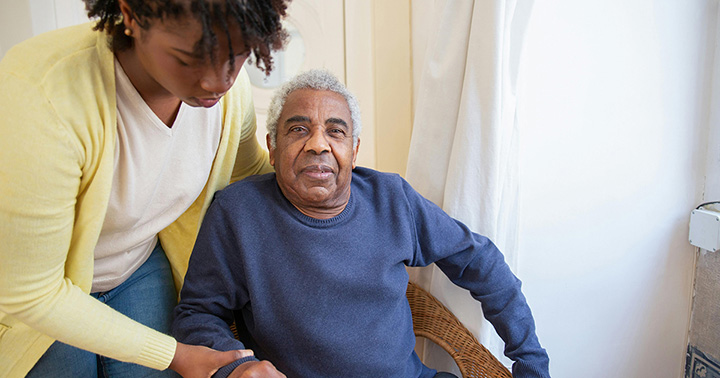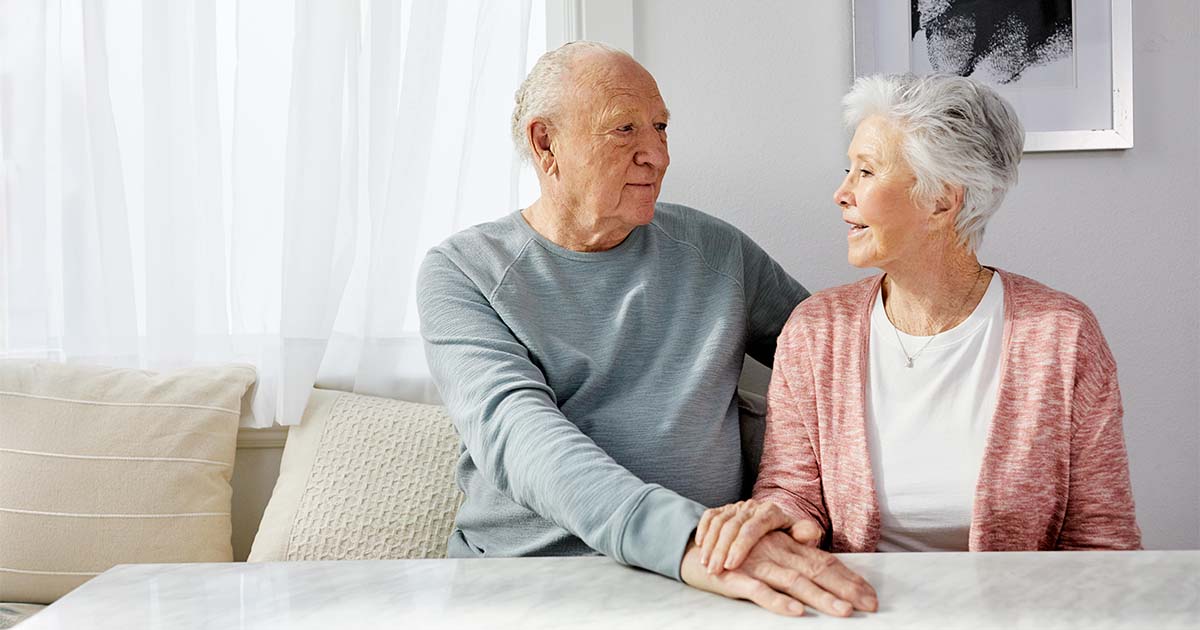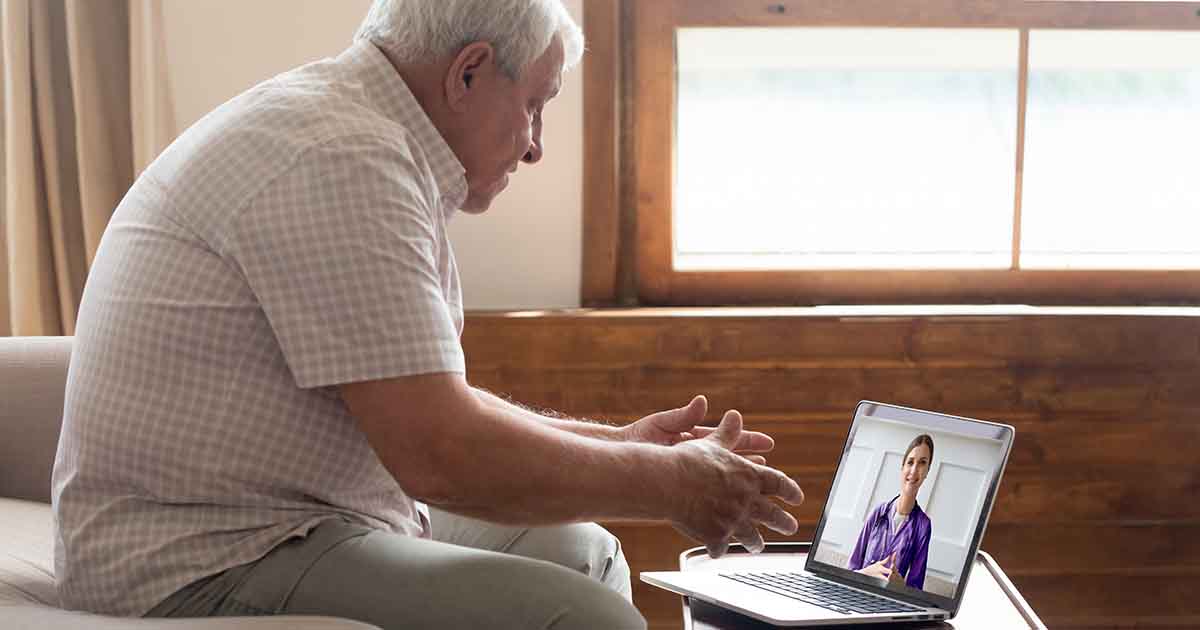Did you know that home health and hospice providers can benefit caregivers in addition to patients?
The Centers for Disease Control & Prevention (CDC) defines caregivers as people who “provide assistance with another person’s social or health needs,” including helping with activities of daily living or household chores and tasks. They often end up providing emotional support too.
As a caregiver’s to-do list grows, it is common for them to feel stressed and overwhelmed. If you are a current caregiver assisting a loved one in their home, home health or hospice care could help supplement your loved one’s care, providing resources and support for you both.
The effects of caregiving
Caring for someone with a chronic illness can be overwhelming. Left unchecked, this stress can be harmful. Nearly 41% of caregivers experience two or more chronic conditions themselves, according to the CDC.
Consistent stress from caregiving can even lead to caregiver burnout, causing mental, emotional or physical exhaustion, and feelings of negativity and lack of concern.
Stress and caregiver burnout
Caregiver burnout can occur when caregivers don’t get the help or support they need. The demands on a caregiver’s mind, body and emotions are overwhelming, leading to fatigue and sometimes hopelessness.
Once you begin to feel the effects of burnout, it becomes difficult to care for yourself, as well as your loved one. There are ways you can prevent caregiver burnout, however, such as considering respite services or seeking out a trusted friend or support group. To learn more about preventing caregiver burnout, click here.
While burnout is a common issue caregivers face, caregiving can have other effects on your quality of life. These include physical and mental health challenges, decision fatigue and uncertainty about the future.
Although home-based care doesn’t typically offer full-time, around-the-clock care for your loved one, there are many ways that home health and hospice services benefit caregivers and offer the support they need.

How home health services benefit caregivers
Home health provides skilled medical care including nursing and therapy services. The goal of home health is to allow patients to maintain their independence while improving their overall quality of life. Typical home health services include wound care, disease management, and patient and caregiver education.
Home health services help caregivers relieve some of the burden of personal care
Home health patients have access to aides in their circle of care. Aides provide intermittent support for skilled care and assist with activities of daily living and personal care items such as bathing, grooming or dressing.
While home health aides do assist with personal care, it is important to note that for a patient to be eligible for home health care coverage through Medicare, they must have a skilled need and be considered homebound by their physician. If these criteria are met and the physician determines aide services are needed, patients can add a home health aide to their care team.
If a patient requires assistance with personal care items or activities of daily living and doesn’t have a skilled need, they may need home care instead.
Home health services benefit caregivers by helping older adults maintain or increase their independence
Through specialty care and disease self-management techniques, patients are encouraged to actively manage their recovery. As a patient gains strength and independence, this decreases reliance on caregivers and lowers the chance of hospital admission, providing benefits to both patients and caregivers.
The home health team can help educate caregivers about their loved one’s condition
When there’s an expert you can rely on, it may help relieve the stress of having to do research and find information on your own.
At Enhabit Home Health & Hospice, we prioritize education, teaching patients and their loved ones about their condition so they feel empowered to self-manage their treatment and reach their goals. We also provide informative resources on specific conditions and supplement care with interactive patient education booklets.
How hospice services benefit caregivers
The hospice care team typically consists of skilled nurses, therapists, social workers, aides, chaplains, registered dietitians, nurse practitioners and hospice physicians. They all work together with a hospice patient’s physician to develop a specialized plan of care that meets the needs of the patient and their loved ones and provides compassionate end-of-life care.
Hospice services can benefit caregivers by relieving some of the burden of personal care
Similar to home health aides, hospice aides provide patients with various personal care and comfort measures such as changing clothing, bathing and grooming. When an aide can take over these personal care items, caregivers can get some time back to themselves.
Hospice services benefit caregivers by offering respite care
Through the Medicare hospice benefit, respite care for a family member whose loved one is on hospice care is covered.
Respite care arranges brief periods (of up to five days) where the caregiver can rest while the patient temporarily stays in a long-term or inpatient care facility. This can provide much-needed time for a caregiver to destress and reconnect with themselves or their family.
Hospice services provide education about the end-of-life journey
Caregivers are often unaware of end-of-life stages and signs, and this can cause severe distress as their loved one progresses.
The hospice care team can help educate caregivers on what to expect as their loved one nears the end of life. This can help caregivers feel prepared and get answers to their questions, allowing more time to spend with their loved one and less time having to find information on their own.
Hospice services offer grief and bereavement support for caregivers
Hospice care benefits caregivers and families even after their loved one passes away. Loved ones of hospice patients are eligible for 13 months of bereavement support, with the ability to extend services if necessary.
Get your loved one started with home health or hospice services at Enhabit
No matter where your loved one is on their care journey, we’re here to help you find the quality, in-home care they deserve. If you have any questions about how home health or hospice can benefit you as a caregiver, please contact us today.
Social Share
At Enhabit our patients are our number one priority. From providing the latest medical practices to building deep personal connections, we’re focused on upholding every patient’s dignity, humanity and sense of control on their health care journey.
Home health
Our home health services give patients access to the care they deserve in the comfort of their own homes. From disease and injury management to recovery from surgery, our clinicians help patients confidently achieve their health care goals.
Hospice care
Our hospice care services place importance on the comfort of every patient living with a terminal illness. Our caring professionals are dedicated to providing not just physical care, but spiritual and emotional support to every patient and their loved ones.





